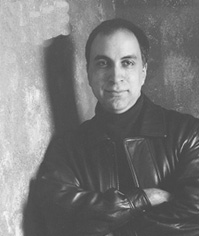
Composer Anthony Cornicello (born in Brooklyn, New York, 1964) writes music that blurs distinctions between performers and electronics, timbre and harmony, composition and improvisation, and explores the boundaries of what may be considered post-classical concert music. His music is vibrant and visceral, full of rhythmic energy and harmonic sophistication, and his forays into live electronics have led to exciting combinations of instruments and processed sound. Cornicello’s background as a jazz pianist is evident not only in the rhythmic activity of his music, but also in his constant investigation of the rich sonorities available from a variety of instruments.
He has been commissioned to write music for the Scorchio Electric String Quartet, ModernWorks! (funding from Meet the Composer/ Commissioning Music USA), the Auros Group for New Music, the Prism Saxophone Quartet, the New York New Music Ensemble, David Holzman, the Group for Contemporary Music, and the InterEnsemble of Padova, Italy. His work has also been featured on the Guggenheim Museum’s “Works and Process” series. Cornicello’s works have also been performed by the Chicago Civic Symphony, Parnassus, ALEA III, Composers Concordance, Madeleine Shapiro, Robert Black, among many other outstanding groups and solo performers. His music has been presented as part of the Darmstadt International Festival of New Music as well as the June in Buffalo Festival.
Cornicello’s Second String Quartet has been recorded by the Atlantic String Quartet; the Second Sonata for Piano by David Holzman (Centaur). More recently, his Post-Modern Waltz was recorded by Eric Moe for Albany Records. A portrait CD of Cornicello’s works is scheduled for 2006 release on Albany Records.
As a performer, he has conducted or played piano in his own works on numerous occasions. While a graduate student at Rutgers, he formed and directed the Janus Ensemble, a group dedicated to contemporary music. More recently, Cornicello has begun performing on the laptop, using a variety of interfaces and the Max/MSP program. Those performances, mostly with EEE!, have had a notable impact on his music, as EEE!’s music ranges from hip-hop to experimental noise. EEE! is based at Eastern Connecticut State University, where Cornicello is an Associate Professor and Director of the Electronic Music Lab.
Cornicello received the Ph.D. from Brandeis University, where he studied with David Rakowski, Eric Chasalow, and Martin Boykan. His teachers also include Charles Wuorinen, Gérard Grisey, and Richard Beirach.
His current fields of interest include developing unusual interfaces for live computer music performances, as well as continuing to investigate resonance and spatialization. His recent and current projects (mostly for string instruments and electronics) have been exploring the latter two, and the series of experimental works ReZenant Garden, performed by EEE! have operated on all three areas of interest. Future projects will include works for instrumental groups or soloists and electronics, as well as turntablists.
Cornicello's works are published by C.F. Peters Corporation and APNM, and he is a member of BMI.
|
|
|
|
|
|

Saturday, April 07, 2007
NPR and music
I like NPR. It's informative - there are news stories on there that I don't hear elsewhere. There are great shows: Car Talk, This American Life, and Fresh Air are highlights for me. Okay, I also like Wait, wait, don't tell me, and Prairie Home Companion (c'mon, who here doesn't like "Guy Noir"?). When I listen to most of these shows, I feel enlightened, educated, and entertained (ah, the three "E"s).
Then comes NPR's take on music. Now, I don't expect much from these shows. Car Talk, is about, well, cars, and Prairie Home Companion is deliberately folksy. That's okay. But whenever music is discussed on All Things Considered, it's usually on par with most pop music stations. I realize that the target audience for NPR is the aging baby boomer (I'm 42, born in 1964, so I'm not really a boomer, or so I tell myself). So, most of the music choices center around nostaglic 55-year olds. And I like some of this stuff. But somehow, I expect more. You'd hope that NPR would try to lift it's listeners out of the corporate-driven world of popular music, into the pure joy of making music that is not dictated by profits and mass appeal.
Surely, there is some aging baby boomer who would love to tell about how listening to Cage changed his life. Or Miles, or Bach, or Josquin.
Actually, one of the best resources for music is Fresh Air. It's a talk show format, so there is a huge variety of guests - writers, actors, and musicians of all stripes. Sure, Terry Gross (the host) has the usual 'culty' pop icons (I think I recall people like Lou Reed, for the 50+ crowd!), but sometimes, she'll have on a Keith Jarrett or Sonny Rollins. I don't recall if she's had 'classical' types (somehow, I'm thinking she's had Reich or Glass), but it's far better than most. Then again, the little tossed-off record reviews are most always of an 'alternative' band like Radiohead. I like Radiohead, but I can hear about them anywhere on the FM dial. What about a new jazz recording? That Ligeti series on CBS/Sony?
posted by Anthony Cornicello
|
| |



